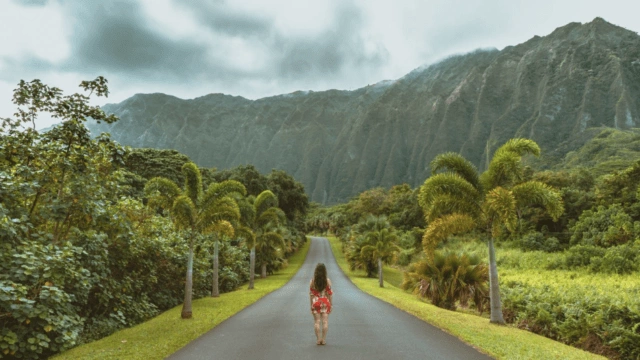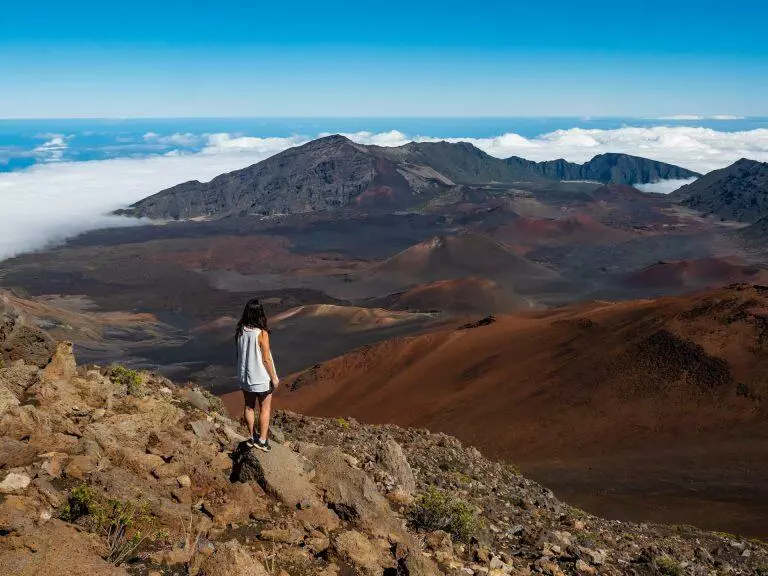During a lecture, mythology expert and literature professor Joseph Campbell was discussing Carl Jung’s concept of the self. He purposefully represented the ego (situated in the center of consciousness) as rectangular, indicating that:
“… its mode of judgment is not in accord with that of the body, with that of nature. This room that we’re in is rectangular, it’s built by consciousness. When you walk out of this room you come into the country out there, this beautiful country, it has nothing to do with rectangles.”
Today, most of the world’s population lives in cities. Huge, sprawling, beehives of metal, glass, and concrete—a world of rectangles. Cities can be fun, exciting, interesting, and lucrative. Cities are also full to the brim with busy people, honking cars, and imposing buildings. We may forget on occasion, but humans are animals; animals that have evolved symbiotically with the natural world.
There are innumerable studies outlining the health benefits of being in nature, especially as a means to relieve stress and anxiety. As the latest research shows, being disconnected from it has serious consequences.
Of course, there are myriad factors responsible for the current stress epidemic (not least the pandemic). Every person’s relationship with stress is unique and dependent on factors like trauma, belief, genetics, resilience, and circumstances. However, given evidence shows cities have a much higher rate of mental health problems, the widespread disconnection from the natural world is a significant factor.

Hawaii boasts some of the most gorgeous natural landscapes in the world, and its indigenous people have long since cultivated a respectful and symbiotic relationship with the land. There are few better places to commune with nature; to usher in a sense of connectedness and wash away that negative stress.
What is Stress?
We tend to use the word ‘stress’ conversationally (i.e, “I’m feeling so stressed,” or “This is stressing me out.”). However, stress is actually a complex physiological and psychological reaction involving multiple systems in the body; namely the nervous, endocrine, and immune systems.
Put simply, it’s the body’s natural response to demands, pressures, or challenges perceived as threatening or harmful. When you encounter a stressor, your brain activates the ‘fight or flight’ response, releasing stress hormones like cortisol and adrenaline to help you cope with the perceived threat.
There is an abundance of data associating chronic stress—especially when experienced during our developmental years—with a host of health issues, like anxiety, depression, heart disease, sleep disorders, weakened immune system, and cognitive impairment. It has also been shown to contribute to unhealthy behaviors, like overeating, substance use, or social withdrawal.
Given this, it’s understandable that people tend to view stress in a wholly negative light. However, this can prove problematic. Stress is a natural, unavoidable part of daily life. Everyone experiences different degrees of it at different points throughout their lives. After all, you can’t undo millions of years of evolution! Whether you like it or not, stress is here to stay.
Good and Bad Stress
Technically, stress is neither good nor bad; it is our perception that gives it either quality. Belief plays a vital role in shaping our physiological responses. As this study shows, the perception that stress negatively impacts health was associated with worse mental health and a higher risk of premature death.
Stress can be split into two distinct types: eustress and distress.
Eustress was coined in the 1970s by Hungarian endocrinologist Hans Selye. Its characteristics have been identified as follows:
- Only lasts in the short term
- Motivates and energizes
- Seen as being within our coping ability
- Can be exciting
- Boosts focus and performance.
Distress, on the other hand, is a ‘negative’ form of stress. Some of its features include:
- Lasts both in the short and long term
- Seen as being beyond our coping ability
- Can cause anxiety and concern
- Triggers negative feelings
- Lowers focus and performance
- Can contribute to mental and physical health issues.
Reframe Your Relationship With Stress
Knowing how to differentiate between the two will help you harness the transformative power of eustress while avoiding distressful situations, or seeking help for any issues they may cause. However, while distress can be undeniably taxing on our health, a clearer perspective often reveals it as a key component of our self-development.
Reframing our attitude to stress can be incredibly empowering.
As you make your way on your Hero’s Journey you will encounter stressful situations. But rather than seeing them as deadly roadblocks, view them as fuel for growth and self-actualization.
Remember, stress is, primarily, a physiological response—your deeper self is immune to it. Let it shape you into a more powerful person.
The Unique Nature of Hawaii

“Hawaii is a paradise born of fire.”—Rand McNally
Hawaii is a volcanic archipelago in the Pacific Ocean renowned for its diverse and breathtaking natural beauty. Home to a vast array of endemic species, the islands are filled with myriad plant and bird species, as well as colorful marine life inhabiting the surrounding coral reefs.
Hawaii’s active volcanoes, such as Kīlauea and Mauna Loa on the Big Island, have shaped the terrain over millions of years. Moreover, Hawaii has the most colorful sands in the world, boasting stunning beaches with white, black, green, and red sands.
Hawaii is home to numerous rainforests and cascading waterfalls with famous spots like the Road to Hana on Maui and Waimea Canyon on Kauai. The archipelago’s tropical climate, influenced by the Pacific Ocean, remains consistently warm with trade winds throughout the year. Despite this, diverse microclimates exist, ranging from arid deserts to cool alpine regions, providing a wide array of outdoor activities and exploration opportunities.
Few places in the world contain such a varied blend of vibrant ecosystems, stunning landscapes, and unique geological features, and few offer such an amazing opportunity to embrace the healing power of nature.
Cultivating Respect and Awareness of the Land
Hawaiian culture and nature are deeply connected. You’re probably familiar with the Hawaiian lei. This garland (usually flowers, plants, or seeds) has become recognized around the globe as an expression of greeting, farewell, honor, love, and congratulations. But few people are conscious of the deeper meanings inherent in this ritual. More than simply a decorative social token, a lei—its making, giving, and wearing— embody a profoundly felt persona as well as spiritual significance.
There is a old Hawaiian proverb, “He alii ka aina; he kauwa ke kanaka.”
This roughly translates to, “The land is the chief; man is its servant.”
In the mother tongue, ‘aina’ doesn’t only refer to ‘land’ but also ‘that which feeds’—the land and its produce, as well as the sea and all we can collect and harvest from it to sustain ourselves. The symbiotic relationship with nature is woven into the Hawaiian language.
The ancient Polynesians revered their land and deeply respected the need to care for it. They strove for balance: to care for the needs of their habitat as well as the creatures it held. Believing their environment had its own mana—spiritual power and energy—they held Nature as sacred.
Ultimately, Hawaiians viewed themselves as not separate from nature, but an inalienable part of it; the direct kin of the animals and plants they shared their world with.
Being in Hawaii not only enables you to harness the soothing power of its natural environments, but to view this connection through the prism of its culture: a unique form of Nature Immersion founded on awe, respect, and interconnectedness.
The Science Behind Nature’s Capacity to Ease Stress
For the last few decades, science has been rapidly catching up to what the Polynesians knew intuitively: that nature plays an integral role in our health and wellbeing. Now, there is a mountain of evidence supporting nature immersion as one of the most effective antidotes to stress.

Attention Restoration Theory (ART)
According to ART, the positive effects of nature on cognition are mainly a result of fascination. An awe-inspiring mountain, a gently babbling stream, or a winding hiking trail capture your involuntary attention, allowing the directed form of attention to rest and recover. Essentially, exposure to nature allows you to recover from mental fatigue, particularly when engaging in directed attention tasks. Research shows this ‘soft fascination’ enables your brain to rejuvenate without taxing cognitive resources.
Stress Reduction Theory (SRT)
SRT was developed In 1991 by R. Ulrich. Drawing upon numerous studies, researchers sought to explain emotional and physiological responses to the presence of natural elements. According to this hypothesis, gazing at scenes with natural features like grass or water elicits pleasant feelings and emotions. These can have a restorative impact, lowering our state of alertness after a stressful scenario.
Exposure to nature promotes positive physiological responses that reduce stress, such as lowering cortisol levels, heart rate, and blood pressure. These changes contribute to an overall sense of relaxation and wellbeing. As the foundational study found:
“… restorative influences of nature involve a shift towards a more positively-toned emotional state, positive changes in physiological activity levels, and that these changes are accompanied by sustained attention/intake.”
Biophilia Hypothesis
Coined by the Harvard naturalist Dr. Edward O. Wilson, ‘Biophilia’ refers to an “innate tendency to focus on life and life-like processes”; to be drawn toward nature and experience an affinity for it.
His hypothesis suggests that this innate tendency shouldn’t be ignored, and is thought to contribute to improved psychological wellbeing and reduced stress levels.
Green Exercise
One of the positive aspects to nature immersion is the added benefit of exercise. Green exercise combines the benefits of exercise with the positive effects of exposure to nature—you’re basically killing two birds with one stone!
As research indicates, engaging in physical activity in natural environments can lead to enhanced mood, reduced stress, and improved mental health. The perfect excuse for a hike up the Kalalau Trail!
Shinrin-yoku (Forest Bathing)

Originating in Japan, the practice of forest bathing involves immersing oneself in nature and mindfully engaging with the environment. Studies have demonstrated that forest bathing can lower stress levels, improve mood, and enhance immune system function.
Social Aspects
People with more access to green spaces often have a greater opportunity for social interactions. Along with the aforementioned benefits of nature, this sense of belonging can help to reduce feelings of loneliness or isolation. The added social benefits can contribute to reduced stress and improved mental health. As one study revealed:
“After adjustment for socio-economic and demographic characteristics, less green space in people’s living environment coincided with feelings of loneliness and with perceived shortage of social support.”
Fortunately, Hawaii isn’t short of beautiful natural environments, nor willing people to share them with.
Maui Recovery: Your Gateway to Nature’s Healing Power
Recovery can be stressful. Before your brain can get back to homeostasis, you may experience moments of distress purely as a result of a neurochemical deficiency. Cravings can also surface, seeming to demand the temporary relief an addiction formerly offered you. This is where our Nature Immersion can help.
Considering Maui Recovery is situated in one of the world’s most beautiful locations, harnessing its diverse natural environments was always going to be part of our program. However, we go one step further. Our expert clinicians employ Joseph Campbell’s ideas of myth, archetype, and ‘the Hero’s Journey’ as an integral part of our recovery program—and the magical setting of Maui is an essential ingredient.
No matter how dark things may seem, we will help you reframe your journey as one of growth and ultimate fulfillment; one that is inseparable from the universe you are a part of.
Along with our exciting Adventure Therapy, nature immersion will give you the chance to reestablish your primal relationship with the natural world, help relieve your distress, and harness your eustress as fuel for becoming.
To learn more about our treatment programs and how we can help you or a loved one, please contact us today.









